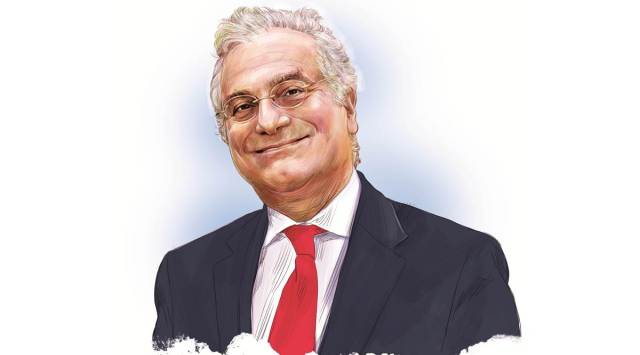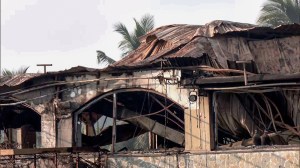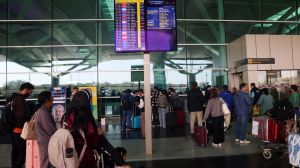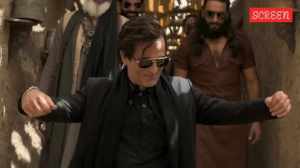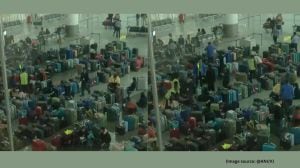EU Ambassador Ugo Astuto shares how Europe has a renewed interest in India and both can work together to deepen strategic partnerships on climate, green energy and connectivity while ensuring a rule-based order. The session was moderated by Deputy Chief of National Bureau, Shubhajit Roy

We are at an extremely positive juncture. That’s based on a number of reasons but for sure, it’s about shared values as open societies, democracy and convergence of interests. Both India and EU are good global citizens who believe in a rules-based system of international governance and have a cooperative approach. That’s the basis of our strategic partnership, which has been gaining momentum over the past couple of years or so. When it comes to trade, last year’s decision to resume negotiations for free trade agreements (FTAs) was a very significant moment in launching our strategic partnership. This has been emphasised by European Commission President Ursula von der Leyen during her recent visit. Both India and EU have set ambitious targets for meeting climate change challenges and we can exchange best practices to address them. On green energy, India has invested massively in solar grids and cleaner sources of energy. The EU, with its Green Deal and 55 programmes, has vowed to become carbon- neutral by 2050.
Digital transition is the next area where our interests converge. As democratic and open societies, we want the digital revolution to be human-centric, consistent with our values and beneficial to our citizens, which means it must be underpinned by respect for their fundamental freedoms. We want to create an environment which is not only conducive to innovation and competition but is also respectful of individual rights and data protection. So, we will be working together on issues such as the security of networks. We want connectivity with quality infrastructure. We want to develop links, not dependencies. As our President recently said, connectivity and infrastructure development must be based on fiscal, social and environmental sustainability. We have seen some of your neighbours being ensnared by debt traps because of unsustainable infrastructure projects. Global Gateway is a major policy initiative that will build on the bilateral connectivity partnership agreed upon in 2021. The EU vision of the Indo-Pacific is pretty similar to India’s advocacy of a rule-based order. Forty per cent of the trade with Europe passes through the Indo-Pacific and we want to contribute to the success story here. These are some of the areas that bring us together. In Europe, there’s a renewed interest in India and we can work together as like-minded democracies.
We cannot simply accept that might is right as it can have consequences not just in Europe but in the Indo-Pacific. We shall continue to support Ukraine and isolate Russia
Shubhajit Roy: Europe has been outrightly critical of the Russian invasion of Ukraine compared to India. What conversations have happened between EU and the Indian leadership?
The unprovoked and unjustified aggression of Russia against Ukraine is a blatant violation of international law and the UN Charter. Russia itself subscribed to these agreements. Our response has to be robust and Europe is united in helping Ukraine defend itself, its future and its right to choose the future of its citizens. Apart from political and humanitarian support, for the first time, EU has supplied weapons to Ukraine. We have five packages of sanctions against Russia to disable Kremlin’s war machine, to affect Russia’s capacity to continue its aggression and bring to account those responsible for this aggression. Unfortunately, there’s also evidence of human rights violations and war crimes. We have seen the indiscriminate shelling of cities and urban centres, and the targetting of civilians in places like Bucha. We cannot simply accept that might is right as it can have consequences not just in Europe but in the Indo-Pacific. We shall continue to support Ukraine and isolate Russia.
Nirupama Subramanian: What does a weakened Russia mean for Europe given its historical context and the present reality? What is the specific outcome that you are looking for?
Story continues below this ad
What we need is the immediate cessation of hostilities and a Russian withdrawal. For four years, we’ve been trying to engage with Russia and establish mutually beneficial relations. The Kremlin narrative about an expansionist NATO being the cause of the current aggression is totally false. NATO has been expanded to respect the free will of east European countries that have emerged from the terrible experience of the Soviet occupation. NATO has never had aggressive intentions vis-a-vis Russia, quite the contrary. Russia was included in the G7, which then became G8. NATO and Russia established a mechanism for a conversation with the EU. Ukraine has never caused any threat to Russia, for sure.
NATO has never had aggressive intentions vis-a-vis Russia, quite the contrary. Russia was included in the G7, which then became G8. NATO and Russia established a mechanism for a conversation with the EU
Nirupama Subramanian: Right now, Europe is united on sanctions. If this war drags on, how long do you think this consensus will hold?
I would say look at how fast the EU has come together and how effectively we have been coordinating with our friends and allies around the world, including the US, UK, Japan, Australia and Singapore, which are also implementing sanctions. When facing such an existential threat to the rules-based system of governance, the EU can and does come together to defend its values. Europe will stay united.
Rakesh Sinha: We’ve seen the Chinese aligning themselves with the Russians on Ukraine. What has been the EU’s engagement with China on this?
Story continues below this ad
We had a virtual summit with China on April 1. We have been telling China that it is also in its interest to speak up and contribute to the international community’s efforts to stop the Russian aggression. Speaking in broader terms, we have a complex relation with China, which is a negotiating partner in addressing global challenges like climate. It’s a competitor in trade. And then our ask is for China to abide by the rules when it advocates a system of governance which doesn’t align with our principles of democracy. So, all these different strands come together. Our relationship with China is important but complex. What we are doing is to address this relationship with clarity, pushing back when necessary.
Our relationship with China is important but complex. What we are doing is to address this relationship with clarity, pushing back when necessary. We have been telling China that it is also in its interest to speak up
Rakesh Sinha: Do you see a post-war order in which the Russians and the Chinese will stick together?
I can’t speculate, I can only look at facts and at the statement of intent, which was issued right before the Olympics when Russian President Vladimir Putin visited China. And we see pretty robust expressions, limitless friendship and so on. This came right before the aggression in Ukraine.
P Vaidyanathan Iyer: It seems that the EU and the individual big countries within it are at cross purposes with each other as far as India is concerned. For instance, Germany and France push bilateral deals with India on defence or big acquisitions. Yet when it comes to trade agreements, the EU supersedes interests of individual countries. How can we reconcile this divergence?
Story continues below this ad
I don’t see that in practice. What I see is a remarkable convergence among all member states. We are all on the same page. In the EU, some competencies have been devolved to European institutions, notably trade. So when it comes, for instance, to the FTAs, that’s an exclusive competency for the EU to negotiate. But then again, I’m happy to note that there is consensus among all member states that we should proceed in earnest. We all realise the interest we have and the potential which lies in the conclusion of an FTA. This is largely true overall in our approach to India. The EU coordinates, complements and reinforces the policies of individual member states. I do not foresee any issue in terms of divergent perspectives, quite the opposite.
P Vaidyanathan Iyer: What about security concerns, be it of India or the EU. India is wary of China as EU is of Russia. So how does one factor in individual concerns?
The response must be multidimensional. It also depends on how you look at security. If you look at security holistically, it’s not just about the weapons system. We’re talking about the digital dimension, the security of networks is becoming more and more important. Our strategy for the Indo-Pacific and its convergence with the vision of India is relevant. It’s also about fostering trade and creating conditions so that the next health emergency can be dealt with by an additional level of solidarity. These are also important elements of security. The EU has a strategic compass. We have decided to take measures to address this challenge in terms of working together better and integrating our procurement. We have decided to set up a rapid intervention force of 5,000 troops. Then, you have the efforts undertaken by individual member states, many of whom are partnering with India in security and defence.
Shubhajit Roy: There’s a perception that China’s rise has been enabled by the West. Europe, too, has helped it weaponise its growing heft despite India flagging concerns about its belligerence. Could something have been done differently?
Story continues below this ad
I don’t know about the past. But what I see is a clear sense of purpose now. Yes, the EU is ready to engage with China but will push back when necessary. You mentioned trade. China cannot simply reap the benefits of belonging to a system of open trade without respecting the same ground rules. We want a level playing field for all. There is the EU legislation on investment, which has been enacted at the national level but follows a framework set at the EU level. We have taken measures for the security of networks.
Harish Damodaran: The sanctions seem to have inflicted much more collateral damage on other countries than Russia. We know that the Russian rouble has strengthened and Russia is merrily selling its oil. But the global prices of crude, fertilisers and commodities have risen. Should this strategy be re-looked at?
Sanctions are needed to stop the invasion and dent Russia’s military capability. Europe is ready to pay a price although we are realising the war’s cascading effects on food security and prices. But let me be very clear, the cause is not the sanctions, it’s Russian aggression. As long as Ukraine is a battlefield, obviously the production of wheat will be limited. So early peace is in everybody’s interest. We’ve also seen Russia stopping wheat-laden ships in the Black Sea. That’s not the consequence of sanctions. That’s a deliberate decision taken by Russia. You can see the plundering of agricultural equipment by Russia in Ukraine. Again, this has nothing to do with sanctions. It’s the decision of the Russian occupiers. Let’s not forget the origin of these issues.
Karunjit Singh: Will the proposed India-EU FTA envisage a stricter IPR regime or include a clause on Government procurement? Has the Indian side showed flexibility from its position in 2013 when the agreement was stalled?
Story continues below this ad
We’ll have to discuss all issues at the negotiating table. I’m happy to say that we have set the framework and roadmap for the resumption of talks, which will start possibly next month. Both sides are aiming at an ambitious and comprehensive trade agreement that can deliver on market access for goods and services. Governments should address procurement, include provisions on trade and sustainable development as well as digital trade. It’s too early to comment.
Karunjit Singh: How has India’s procurement of discounted crude oil from Russia impacted its perception in Europe?
Europe, as of today, is the largest importer of oil and gas from Russia. So, we understand the compulsions of our partners. What we are trying to do is wean ourselves away from this dependency. We have started the process and we are determined to do that in a short span of time. We are currently discussing six packages of sanctions that will also affect the delivery of oil. How can we achieve that? We can improve the integration of our energy system in Europe by interoperability and we are already doing that. The investment done in the past few years is now paying us back. We can invest in our strategic reserves, we can diversify, and we are looking at alternative sources, including LNG from a number of countries. We need to accelerate what we were doing in any case, which means a transition to non-fossil fuel energy sources. We cannot be dependent on a neighbour who can use fossil fuels to blackmail us. We all need to look at the security of our supply chains and greening our energy needs.
Shubhajit Roy: Are you disappointed with the pace of the FTA negotiations?
Story continues below this ad
I don’t know about the past. But today, I sense optimism and a chance to bring this negotiation to a conclusion. We have a clear political commitment as articulated by Prime Minister Narendra Modi, EU institutions and 27 member states. There is a clear sense of purpose.
Esha Roy: Although the EU has set ambitious targets, the latest IPCC report says we may not be doing enough to meet the 1.5-degree target. Should we look beyond energy transition? Also the finance and technology transfer that was promised to India and other developing countries by developed countries has not happened.
COP 26 has clearly not solved the climate challenge but at least it has done the groundwork for the international community to come together and finally address the issue of keeping the global temperature below 1.5 degrees. It has also helped in a general awareness about climate being an existential risk. An important achievement at COP 26 was the pledge to review our commitment on a yearly basis. I’m hopeful that this awareness is going to translate into even more stringent commitments at COP 27. From the EU side, you are aware of our commitment to become carbon neutral by 2050 and cut emissions, including 55 per cent reduction in greenhouse gases, by 2030. In the EU, this is a legal obligation. The role of India has also been instrumental in COP 26 as your Prime Minister announced solar energy and zero carbon targets.
The discussion on climate finance is important. COP 26 has achieved the objective of making the target of the $100-billion finance achievable. We are not yet there, so I understand your frustration. But I’m glad to say that the EU is the first provider in climate finance. Can we do more? Mitigation and adaptation are equally important.
Harikishan Sharma: How has the India-EU Water Partnership progressed?
Story continues below this ad
It has worked well so far and it brings together the expertise from Europe and best practices from India on management of water resources. India will have an increased population in cities and towns requiring access to clean water in a sustainable way. It needs a non-polluting waste water system. We have started work on the Tapi river and want to replicate this experience in other places. We also have Twinning Programmes of European and Indian cities to see how we can address water issues.
Ananthakrishnan G: At the recent Raisina Dialogue, the Indian Foreign Minister raised questions about how a rules-based order can justify whatever happened in Afghanistan.
The EU has pretty similar views on Afghanistan as India. We would like to see a peaceful Afghanistan posing no threat to neighbours and where citizens can enjoy their rights, particularly women and girls. We know the dangers of a humanitarian catastrophe in Afghanistan. That’s why the EU and its member states have been at the forefront of providing humanitarian assistance. We pledged a significant amount at a pledging conference in March. We are ready to help the Afghan population, irrespective of the dispensation in power. Our help does not mean the recognition of Taliban rule. We want to help people survive. Our engagement is based on a principle of solidarity with the Afghan people. We will need clear engagement or respect for human rights. And those Afghans who want to leave Afghanistan should be free to. From our side in Europe, we will welcome them.
Ananthakrishnan G: But isn’t the war against Putin impacting ordinary Russians? Yet you want to support Afghans despite Taliban rule. Isn’t there a dichotomy here?
In Afghanistan, we are talking about basic survival needs that are not met by the ruling establishment. Sanctions are not directed against the Russian population, they are directed towards those responsible for the decision to attack Ukraine. They are directed towards the tools that the Kremlin used to attack Ukraine. For instance, there’s a blacklist of Russian government officials, making it impossible for them to travel to Europe. We are blocking their financial institutions in Europe because they are used by the Kremlin to fund the war effort. The distinction is there.
Deeptiman Tiwary: While it talks of battling global terrorism, Europe’s focus on India-centric terror groups, operating with Pakistan’s support, has been less than satisfactory. How is the EU going to address this, considering the West needs Pakistan again to engage with Afghanistan?
Counter-terrorism cooperation is part and parcel of the various dialogues we have in place with India, at the EU level and also at the level of individual EU member states. Europe is also a victim of terror and it requires a cohesive and consistent response from the international community, which we are doing, including at Financial Action Task Force (FATF). No country should be harbouring terrorists or allow its territory to be used for targetting other countries.
Nirupama Subramanian: Can there be a negotiated end to this war? Prime Minister Modi, during his recent visit to Europe, called for an immediate ceasefire between Russia and Ukraine. Is there a role that India can play here?
I certainly hope there can be a negotiated end to the war. I’m also cognisant of the fact that Ukrainians themselves have signed the terms of this negotiation as a free country, a country which has the right to determine its future. There is a high level of distrust vis-a-vis President Putin. Actually, India does play a role. I understand the Prime Minister has spoken to President Putin as well as President Zelenskyy and I hope that the voice of reason can be heard.

